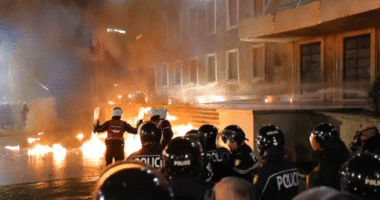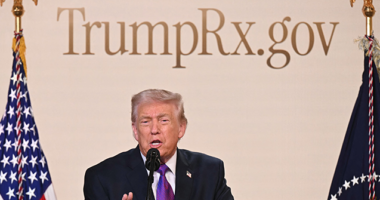Share this @internewscast.com

WASHINGTON (AP) — Republican Speaker Mike Johnson predicted Monday that the federal government shutdown might become the longest in history. He stated he “won’t negotiate” with Democrats until they agree to halt their health care demands and reopen the government.
Standing alone at the Capitol on the 13th day of the shutdown, the speaker expressed his unawareness regarding the Trump administration’s dismissal of thousands of federal workers. This mass layoff is an uncommon move, largely seen as an attempt to use the shutdown to decrease the government’s size. Vice President JD Vance has cautioned about upcoming “painful” cuts, even as employee unions take legal action.
“We’re barreling toward one of the longest shutdowns in American history,” Johnson of Louisiana said.
With no resolution in sight, the shutdown is projected to persist indefinitely. The closure has suspended standard government functions, closed Smithsonian museums and other significant cultural landmarks, and caused disruptions at airports, adding uncertainty to an already fragile economy.
The House is not in legislative session, with Johnson refusing to call lawmakers back to Washington. Meanwhile, the Senate, which was closed Monday for the federal holiday, will reconvene on Tuesday. However, senators are caught in a loop of unsuccessful votes, with Democrats standing firm on their health care demands.
Johnson expressed gratitude to President Donald Trump for ensuring military personnel receive their pay this week, which removed a significant point of pressure that might have compelled the parties to negotiate. The Coast Guard is also receiving pay, as a senior administration official confirmed on Monday. The official requested anonymity to discuss plans not yet officially announced.
The core of the shutdown is a debate over health care policy—specifically the Affordable Care Act subsidies that are nearing expiration for millions of Americans who depend on government assistance to buy their own health insurance policies on the Obamacare exchanges. Democrats are pushing for the extension of these subsidies, while Republicans believe the issue can be addressed later.
House Democratic Leader Hakeem Jeffries said with Republicans having essentially shutdown the chamber now for a fourth week, no real negotiations are underway. They’re “nowhere to be found,” he said on MSNBC.
With Congress and the White House stalemated, some are eyeing the end of the month as the next potential deadline to reopen government.
That’s when open enrollment begins, Nov. 1, for the health program at issue, and Americans will face the prospect of skyrocketing insurance premiums. The Kaiser Family Foundation has estimated that monthly costs would double if Congress fails to renew the subsidy payments that expire Dec. 31.
It’s also when government workers on monthly pay schedules, including thousands of House aides, will go without paychecks.
The health care debate has dogged Congress ever since the Affordable Care Act became law under then-President Barak Obama in 2010.
The country went through a 16-day government shutdown during the Obama presidency when Republicans tried to repeal the Affordable Care Act 2013.
Trump tried to “repeal and replace” the law, commonly known as Obamacare, during his first term, in 2017, with a Republican majority in the House and Senate. That effort failed when then-Sen. John McCain memorably voted a thumbs down on the plan.
With 24 million now enrolled in Obamacare, a record, Johnson said Monday that Republicans are unlikely to go that route again, noting he still has “PTSD” from that botched moment.
“Can we completely repeal and replace Obamacare? Many of us are skeptical about that now because the roots are so deep,” Johnson said.
The Republican speaker insists his party has been willing to discuss the health care issue with Democrats this fall, before the subsidies expire at the end of the year. But first, he said, Democrats have to agree to reopen the government.
The longest shutdown, during Trump’s first term over his demands for funds to build the U.S.-Mexico border wall, ended in 2019 after 35 days.
Meanwhile, the Trump administration is exercising vast leeway both to fire workers — drawing complaints from fellow Republicans and lawsuits from employee unions — and to determine who is paid.
That means not only military troops but other Trump administration priorities don’t necessarily have to go without pay, thanks to the various other funding sources as well as the billions made available in what’s commonly called Trump’s One Big Beautiful Bill Act that’s now law.
The Pentagon said over the weekend it was able to tap $8 billion in unused research and development funds to pay the military personnel. They had risked missed paychecks on Wednesday. But the Education Department is among those being hard hit, disrupting special education, after-school programs and others.
“The Administration also could decide to use mandatory funding provided in the 2025 reconciliation act or other sources of mandatory funding to continue activities financed by those direct appropriations at various agencies,” according to the nonpartisan Congressional Budget Office.
The CBO had cited the Department of Defense, the Department of the Treasury, the Department of Homeland Security, and the Office of Management and Budget as among those that received specific funds under the law.
“Some of the funds in DoD’s direct appropriation under the 2025 reconciliation act could be used to pay active-duty personnel during a shutdown, thus reducing the number of excepted workers who would receive delayed compensation,” CBO wrote in a letter responding to questions raised by Sen. Joni Ernst, R-Iowa.
__
Associated Press writer Josh Boak contributed to this report.

















